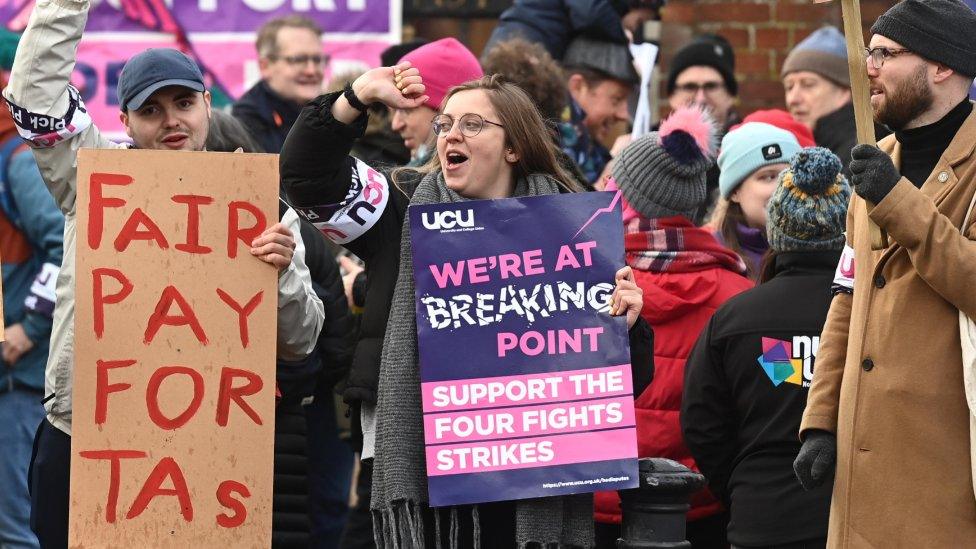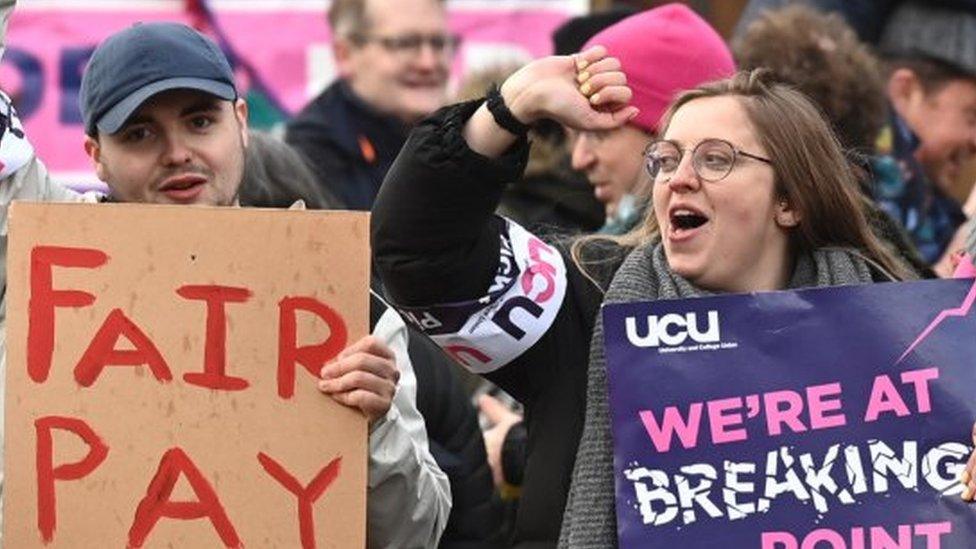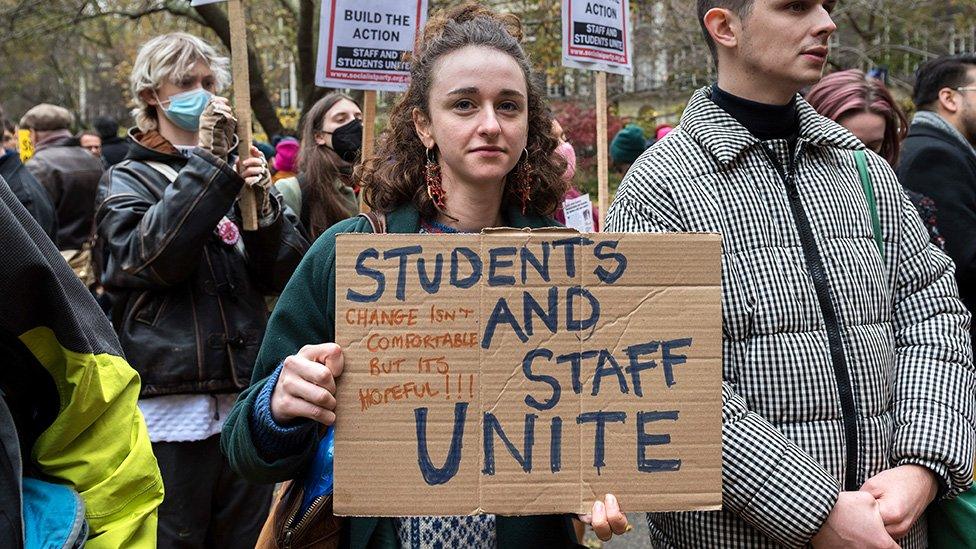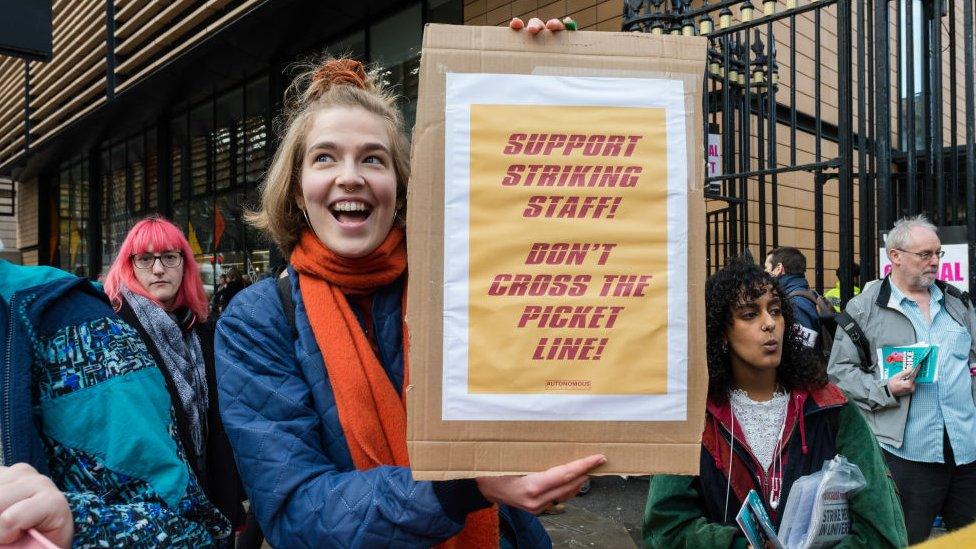University strikes: NI staff to take further action
- Published

The dispute between the UCU and university employers is a long-running one, with previous strikes in 2019 and 2020
Queen's University Belfast (QUB) and Ulster University (UU) face three further days of strike action by some staff at the end of November.
The University and College Union (UCU), which represents lecturers and support staff, is taking the action over pay, working conditions and pensions.
Union members were previously out on strike for 10 days in February and March.
Staff at 70 UK universities plan to walk out on 24, 25 and 30 November.
That includes QUB and UU in Northern Ireland as well as the Open University.
Union members do not have to inform universities in advance if they will strike so it is not clear how many classes or lectures will be cancelled.
It is also not known exactly how many staff at QUB and UU will strike, but UCU is a union with hundreds of members at both universities.
In a statement, the UCU said the strikes would be "the biggest ever to hit UK universities" and could affect more than two million students.
The action by the union followed ballots of members in October.
In Northern Ireland, about 80% of UCU members voted for strike action in separate ballots over both pay and working conditions, and pensions, with a turnout of more than 50%.
The law in most of the UK states at least 50% of union members entitled to vote must do so for strike ballots to be valid, but that law does not apply in Northern Ireland.
The Universities and Colleges Employers' Association (UCEA), which represents university employers across the UK, had proposed a 3% pay increase for staff this academic year, with 9% for those on the lowest pay grades.
In response to the planned strike UCEA's Chief Executive Raj Jethwa said there would be disappointment in universities at the action.
He also said that while pay negotiations for 2022-23 had concluded, UCEA was looking at the possibility of bringing forward pay talks for 2023-24.
"All higher education institutions fully recognise the inflationary pressures currently facing staff," he said.
"Any threats of industrial action will do nothing to support students, staff or the many higher education institutions working hard to avoid redundancies or maintain staffing levels, having delivered the August pay uplift.
"UCU needs to provide its members with a realistic and fair assessment of what is achievable before encouraging strike action directed at students once again."
The UCU said it wanted staff to receive a 12% pay rise, or retail price index (RPI, a measure of inflation) plus 2%.
'Dangerously high workloads'
It has called that "a meaningful pay rise to help staff deal with the cost-of-living crisis" and claimed that, overall, university staff pay has fallen in value by 25% since 2010 relative to RPI, due to a series of below inflation pay awards.
Additionally, the union has called on employers to address "dangerously high workloads" and scrap zero-hour contracts.
It also said, due to pension cuts, the average UCU member stood to lose 35% from their guaranteed future retirement income.
The UCU president, Dr Jo Grady, said action could still be avoided if employers made improved offers to staff.
"Vice-chancellors are choosing to pay themselves hundreds of thousands of pounds whilst forcing our members onto low paid and insecure contracts that leave some using foodbanks," she said.
"They choose to hold billions in surpluses whilst slashing staff pensions."
The dispute between the UCU and university employers is a long-running one, with previous strikes in 2019 and 2020.
'Meaningful action'
The president of NUS-USI said students supported staff taking strike action at Queen's, Ulster and other universities..
Chloe Ferguson said: "This is the fifth year in a row that government cuts to education and slashes to workers' rights across the UK have resulted in strike action on our campuses,"
"In that time, staff and students have stood together in the fight for better pay and conditions for all university staff, including the thousands of postgraduate students on increasingly casualised contracts.
"The struggles we face as students are inextricably linked to the reasons that staff are striking.
"Universities and employers must come to the table and take meaningful action to end these disputes."
- Published28 January 2022

- Published24 October 2022

- Published20 October 2023
